Interview: Mano Le Tough
The Irish DJ-producer invites XLR8R to his Swiss home for an in-depth interview.
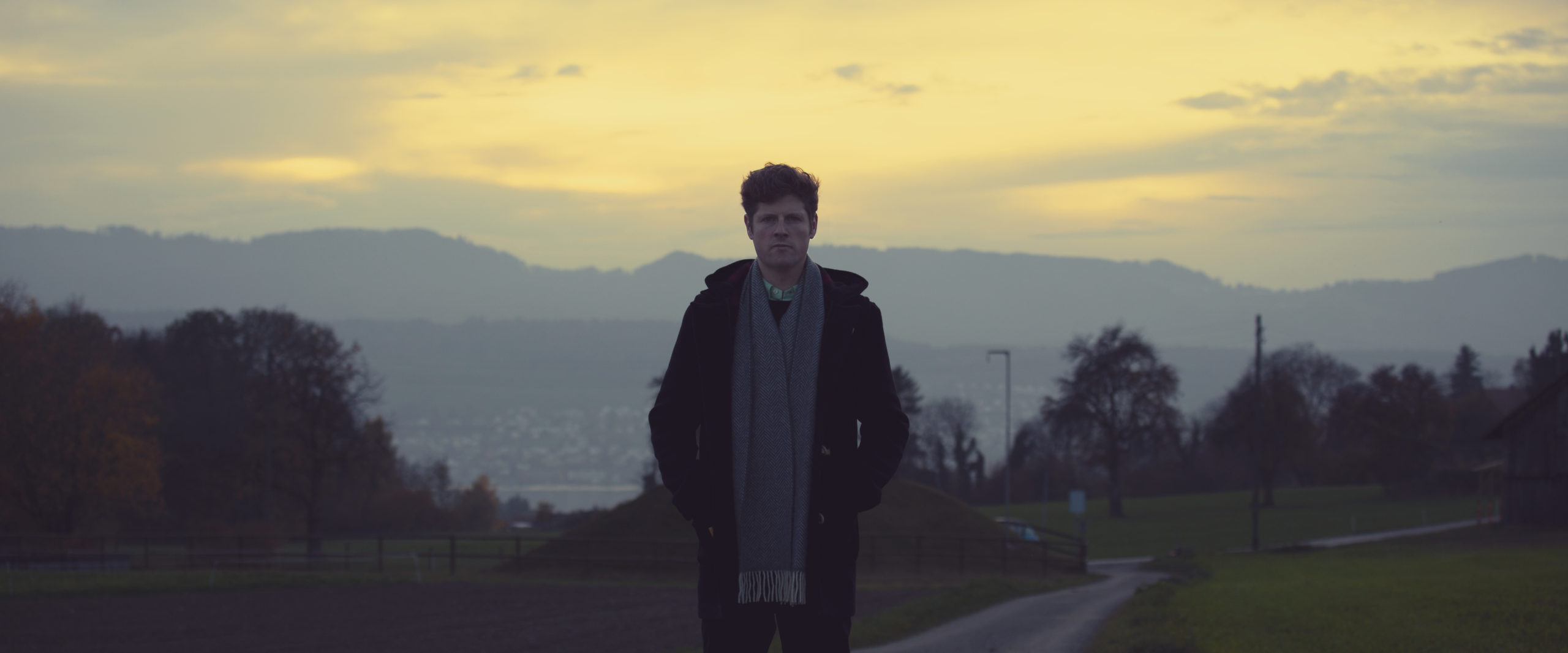
Interview: Mano Le Tough
The Irish DJ-producer invites XLR8R to his Swiss home for an in-depth interview.
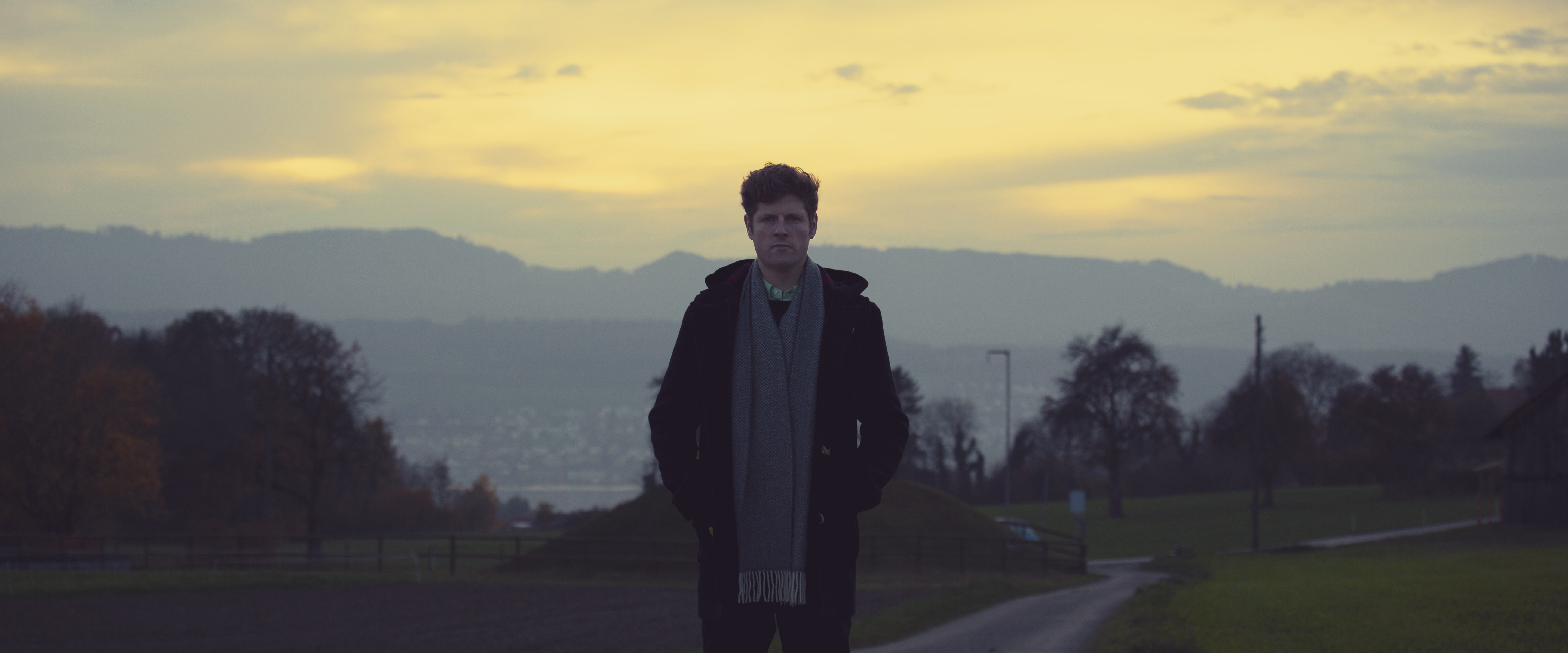
The air is crisp in Meilen. Nestled on the banks of Lake Zurich, with the magnificent Swiss alps far on the horizon, the charming country town is a picture of calmness and serenity. Besides the small center, which hosts all the necessary amenities, Meilen is surrounded by rolling hillsides of luscious green fields, peppered with secluded farmhouses and endless forest trails. It is here that Niall Mannion calls home, and today he is just finishing his early-evening run, a key part of his daily routine ever since he made the move from Berlin in the summer of the 2014. In just six hours time he is scheduled to play an all-night set in London to celebrate the launch of his new album.
The profile of Mano Le Tough is well known: The Irish DJ-producer has been a key figure in the flourishing house and techno scene ever since the release of Changing Days, his debut album on Permanent Vacation in 2013. His deeply melodic and emotionally-provocative output sits at the more accessible end of the electronic music spectrum, an initial stepping stone on the pathway to exploring the deeper, darker realms of the genre. Interviews, though scarce today, provide a snapshot into his artistic processes and underlying motivations, but also elude to a professional and guarded individual who consciously sidesteps the limelight. As a result, the profile of Niall Mannion, the man behind Mano, is almost unknown—so when the press release for Trails, his latest album, described it as his “deepest, most personal” work to date, it seemed like the right time for a more in-depth piece. After some protracted discussions, Mannion agreed to open his doors to his Swiss home to give his take on his success and reveal the inspirations behind his latest work.
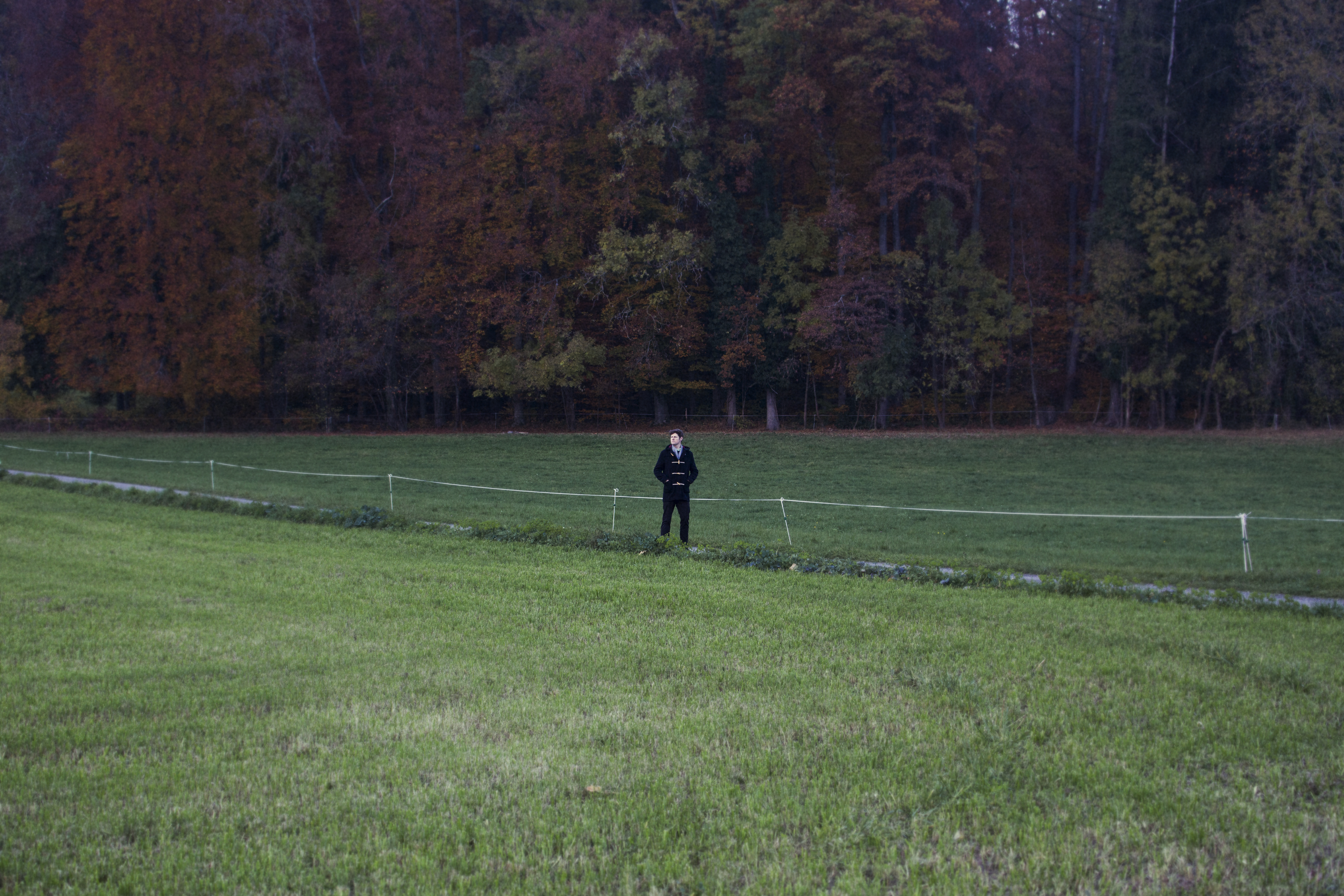
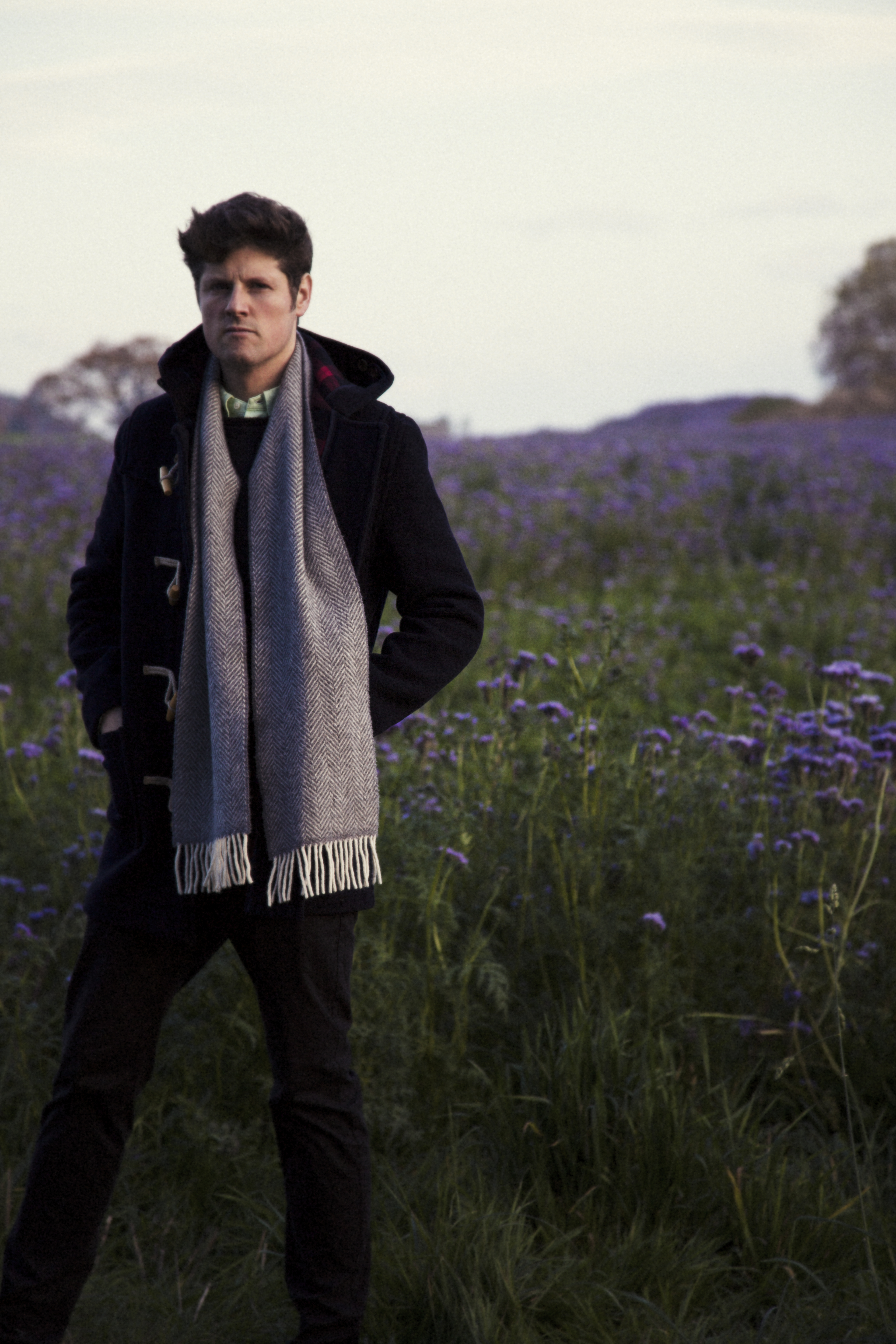
Contrast is a word that springs to mind as you disembark the train at Meilen train station. Though located only 15 minutes from the center of Zurich, it feels disconnected from society, a secret utopia that operates in slow motion—as if nobody really has anywhere they need to be. Mannion’s apartment is warm and comfortable; his hardware-heavy studio occupies most of the living room space alongside his records, the genres of which span jazz, choral and the odd Villalobos classic. In the corner are his golf clubs—another passion of his—along with several pairs of trainers and his silver DJ case. His splits his week days between producing music, trail running and general administration. Like almost anyone who does not have a personal relationship with him, it’s rare to see him outside of the DJ booth, a place that he frequents more regularly than almost any other artist—but to spend time with him in this setting only highlights the bold line that exists between his private home life and the infinite hedonism associated with his professional persona.
![Photo: Alexander Newton - Tall Guy Pictures [http://www.tallguypictures.com/]](https://xlr8r.com/wp-content/uploads/2019/06/2o5b3739-copy.jpg)
![Photo: Alexander Newton - Tall Guy Pictures [http://www.tallguypictures.com/]](https://xlr8r.com/wp-content/uploads/2019/06/2o5b3782-copy.jpg)
![Photo: Alexander Newton - Tall Guy Pictures [http://www.tallguypictures.com/]](https://xlr8r.com/wp-content/uploads/2019/06/2o5b3668-copy.jpg)
But such disparity was only ever partially intended. “The line [between home and work] was far more blurred in Berlin,” he says. “Everything is a bit more blurred there.” Almost all press coverage will refer to Mannion as a “Berlin-based DJ,” based on the fact that it was in there that he carved his identity, having moved from Greystones, Ireland to pursue a career as a DJ in 2007. Berlin, he says, was his home—and he originally planned to split his time between there and Meilen with his Swiss girlfriend, but became enamored by the place after stumbling on the apartment in which he now lives. It was, he confesses, “a real blessing.”
And the benefits of the move are numerous. Health and fitness have been a part Mannion’s life since he began playing rugby as a teenager—but he has made a deliberate move towards a more balanced lifestyle since 2012 after discovering a dormant love for cycling and running—and the Meilin landscape has perfectly complimented this transition. He confesses to having restricted his partying to just “a few times a year,” has changed his diet, and goes running in the hills every day. During our two-day stint together, Mannion cooked an alpine feast, including fresh fruits, avocados, cheese; and took us for a “short” jog through the mountains—before dining at the world-famous pizzeria that lurks around the corner of his apartment. “Being healthy has been a really positive thing for everything, music included,” he explains. “It’s given me so much energy and that has given me clarity of thought,” he continues. “It’s offered me the opportunity to really develop as an artist.”
![Photo: Alexander Newton - Tall Guy Pictures [http://www.tallguypictures.com/]](https://xlr8r.com/wp-content/uploads/2019/06/2o5b4019-copy.jpg)
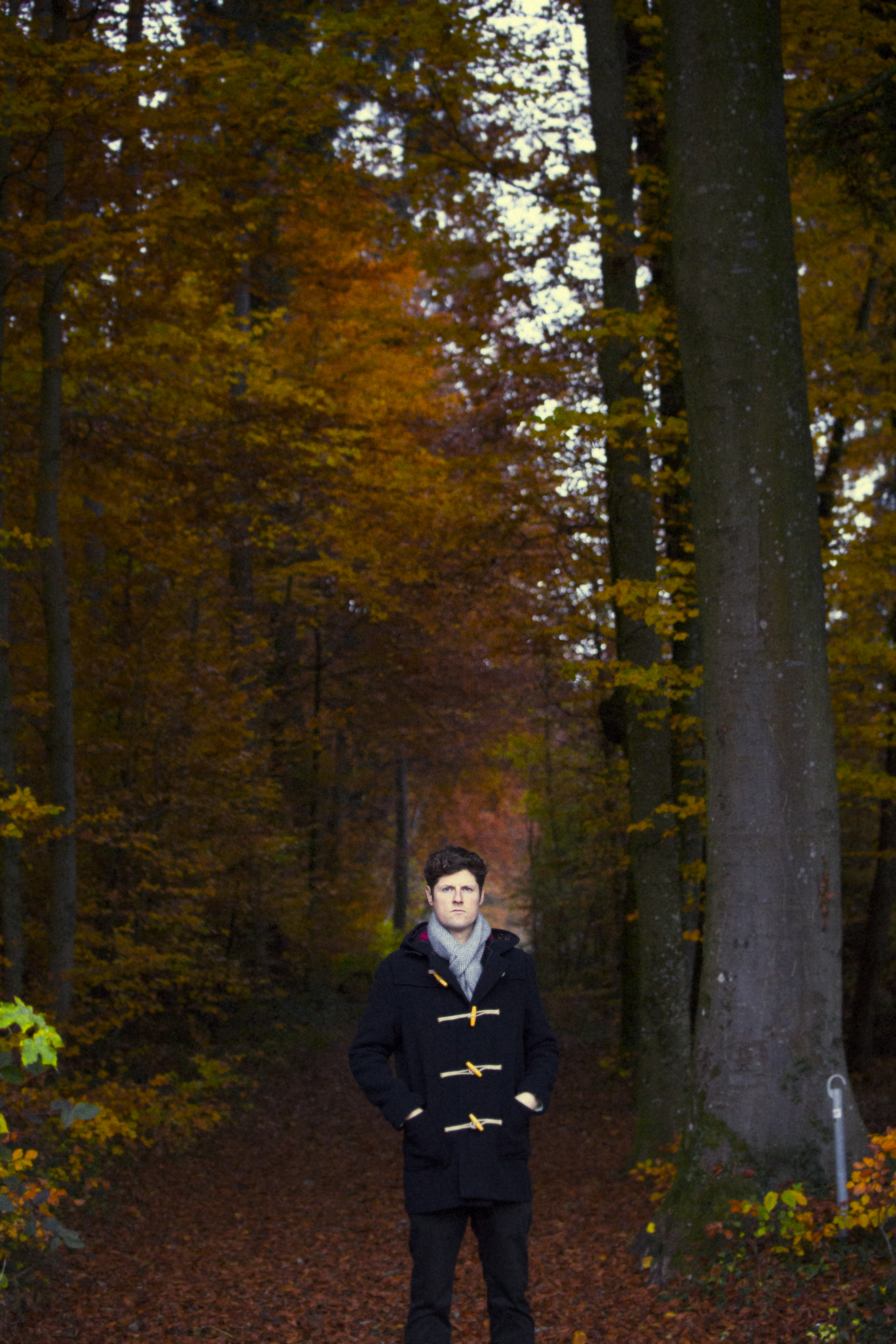
Symbolic of this development is Trails, his much-anticipated sophomore long-player which was mostly recorded during a six week period of “manic creativity” over January and February this year. “I was waking up at about 5.30am each morning—working and drinking a lot of coffee, in just this kind of open flow. It was pretty full-on,” he explains. “I didn’t give myself any boundaries. I hadn’t had that kind of period in the studio for a couple of years and it felt like all that energy had been building up,” he continues. While Mannion is unsure as to whether it is his most personal work, he reveals that it is more “honest” than his previous releases because he has more trust in himself as an artist. In his previous interviews, most notably last year’s lengthy discussion with Resident Advisor, Mannion has spoken about a desire connect with his listeners on an emotional level—but Trails, he says, is a vehicle for he is own self-expression “rather than to provoke something in anyone else.” “I just made it for myself and any connection is just a bi-product of that,” he continues. “The less you worry about how the music will be received by the public, the better. Once you start thinking about that, you take yourself away from the music.” In his search for this musical integrity, Mannion took time away from the DJ booth and reveals that he didn’t listen to one track from anyone else for nearly two months.
Nonetheless, the release of the LP comes at an interesting time in Mannion’s career. Recent years have seen his touring schedule grow considerably, the consequence of which has been a decrease in his studio output. Considering that his last release, the Tempus EP, is dated March 2014, it’s hard not to consider Trails as at least something of a surprise. But Mannion, as he reveals, does not see it as such: He explains that the album was conceptualized over the course of 2014, and that some of the basic sketches are 18 months old. The album title stems both from the the mountain trails that have become an increasingly important part of his life and, on a more profound level, the paths he has taken to get to this point today. “I wanted to set myself a creative framework before I started recording the album,” he says. As he explains, Trails serves as a tangible representation of his maturation since 2013’s Changing Days; a musical yardstick for where he is sonically right now.
“I made the album because I wanted to set myself a challenge and create a document of what I’m thinking about creatively at this moment—it’s like a snapshot of my current musical ideas,” he explains. “A lot has changed since Changing Days: I’ve developed a lot in terms of production technique, and I trust myself a lot more in terms of taking chances. In this one, I was much more open with the process, and I had a lot more confidence,” he continues. “For me to develop, I need to finish projects and move onto bigger ones. I never see a record as an end in itself; it’s just another step in the process of the musical and artistic development. I’d like to be an artist who you can see grow over a long period of time through a decent output.”
This intention—this clarity of purpose—has been a common theme throughout Mannion’s career to date. While fortune and hard work are fundamental denominators in success, Mannion’s status today would appear to stem from a cumulation of well-calculated and preconceived decisions—be it leaving Ireland in 2007, releasing Trails now, or co-founding Passion Beat, the monthly Berlin party that gave him the platform on which to develop his DJ skills. Though concealed by an affable Irish humor, there’s no masking the deep-rooted ambition in Mannion’s character, a trait that goes some way to explaining why he has established a reputation as one of the hardest touring DJs out there. “I wouldn’t be where I am today if I wasn’t determined,” he says, something that is also evidenced by his early time Berlin, a three-year period that saw him “struggle to pay the rent” while “chasing the dream” and taking any local gig he could get before his first international booking in 2010. As Mannion confesses, this development of his skills remains his major source of motivation today.
As for this fortune—it’s both sonically and on a wider scale, too. His invitation to the Red Bull Music Academy in 2008—something Mannion describes as “one of the most important developments” in his early career, giving him a musical identity at a time when he was struggling to find a direction—was in part fortunate, but perhaps Mannion’s greatest blessing is timing. There’s no denying the his rich and vocal-laden sound has fallen in tune with the zeitgeist in recent times. It’s certainly no coincidence that he has long formed close ties with Innervisions, one of the most revered house and techno imprints for the best part of a decade. Would such a sound have been so widely received during the minimal boom, for example? “Timing is always a factor [in success],” explains Mannion. “But I think that when you’re doing anything in the arts, if you’re doing it in an honest way, then the other side of things takes care of itself,” he continues.
“If you try to produce records to fit in with trends then you’re already two steps behind. It’s like when you get promos now, or especially last year, when everything just sounded like an imitation of an Innervisions record.”
“With hindsight you can say that the timing has been right, but there’s been no thought about it,” he says. “The timing is just what’s developing in the present. If you look at jazz records, like Kind of Blue by Miles Davis or A Love Supreme by John Coltrane, then you might say the timing is perfect—but the only reason the timing was perfect was because that was the next direction that music was going. Actually, they were futuristic records, and that was why the timing was right,” he adds. “If you try to produce records to fit in with trends then you’re already two steps behind. It’s like when you get promos now, or especially last year, when everything just sounded like an imitation of an Innervisions record.”
On the subject of Innervisions, it would be incomplete to the discuss Mannion’s success without highlighting the label’s influence. It is no stretch to state that this association has been a key factor in the growth of his profile after 2012. Mannion’s relationship with label-heads Steffen Berkhahn (a.k.a. Dixon), Kristian Beyer and Frank Wiedemann (together known as Âme) stretches back almost four years, and has now grown to the extent that Mannion has become something akin to an honorary member; a guest whose music is strongly supported by the imprint and who regularly plays at the infamous Lost in a Moment parties.
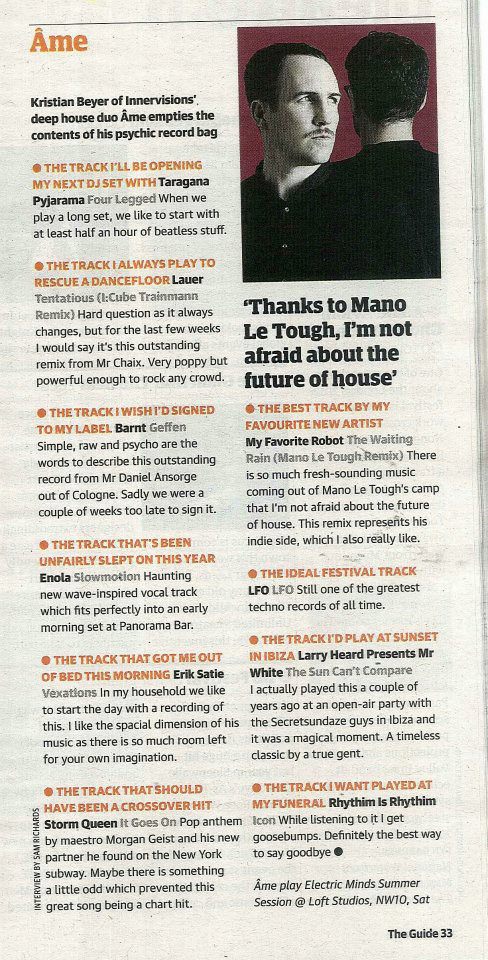
To give some examples, in a 2012 interview with the Guardian newspaper, Beyer stated that “Thanks to Mano le Tough,” he is not worried about the future of house; and he and Dixon were pushing “Energy Flow” and “I See Myself in You” from Mannion’s new album long before the release date—most memorably in the latter’s Dekmantel Boiler Room set in June. “That [Beyer’s comment] was a big moment for me—it gave me confidence in my ability,” he explains. “It was at a point when I was trying to develop my own kind of sound, and I was starting to sing on the records. It was the first time that I was trying to do something that wasn’t completely derivative, or that I felt comfortable to properly express myself. When you’ve got people supporting your records, and playing them in Panorama Bar, then you realise, “OK, this is real.”
But as Mannion attests, the scope of Innervisions’ influence has been far greater than just support of his work. In many ways, his behavior—his attitude towards press, his touring schedule and the calculated manner in which he operates—are all similar to that of the label’s key figureheads, all of whom have manufactured a brand image that complements the marketability of their music. On more than one occasion, Mano refers to them as “role models,” a grand compliment coming from someone who is so established in his own right. “Their [Dixon, Beyer and Wiedemann’s] philosophy has definitely helped me with the business side of being an DJ,” he explains. “They’re artists, but they’re also entrepreneurs; they plan what they are going to do, and they really discuss it. I think that’s super important,” he continues. They’ve been in the game a lot longer than I have, and I’ve learned a lot from them.”
![Photo: Alexander Newton - Tall Guy Pictures [http://www.tallguypictures.com/]](https://xlr8r.com/wp-content/uploads/2019/06/2o5b4281-copy.jpg)
![Photo: Alexander Newton - Tall Guy Pictures [http://www.tallguypictures.com/]](https://xlr8r.com/wp-content/uploads/2019/06/2o5b4913-copy-2.jpg)
Positioned where he is, considered to be one of the world’s finest DJs, Mannion confesses that he has already achieved almost all he could wish for behind the decks. “I’ve played at most of the places I want to play and have a pretty busy schedule,” he explains. Make no mistake: His enchantment with and profound appreciation for DJing remain strong, but he describes the relationship as “delicate,” and something that he must work hard to protect. Digging for new tracks and playing them out, something he still invests a lot of time in doing, remains a driving force behind his efforts, as does a desire to continually improve—but central to this pursuit is selecting the shows that he takes, a “super important” process that he undertakes alongside James, his booker at the Sweatlodge Agency.
“You really have to look after your relationship with DJing,” Mannion explains. “If you do it too much, or you play in the wrong places, the love for it can fade, and you can’t really come back from that place—unless you have a break from it,” he continues. “I’ve seen it happen to people, when they don’t go in the right direction, or just do it for money. The highest-paying gigs often aren’t the best ones. It’s just like anything that you do—if you do it in the right way, then it can last a long time, but you just have to be smart about it.”
![Photo: Alexander Newton - Tall Guy Pictures [http://www.tallguypictures.com/]](https://xlr8r.com/wp-content/uploads/2019/06/2o5b3823-copy.jpg)
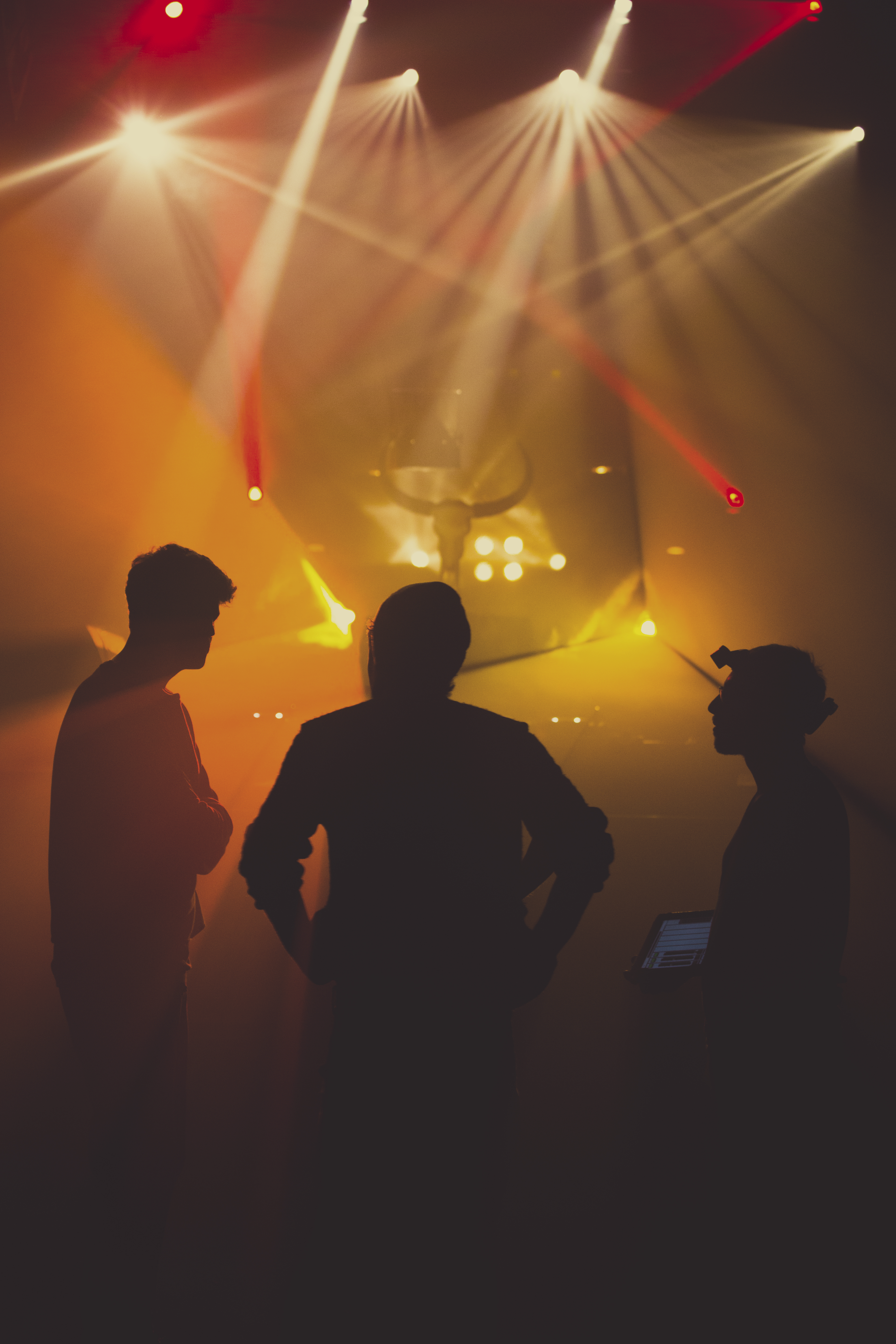
Also interesting is the role of production in Mannion’s artistic repertoire. He’s lauded as a DJ—but, generally speaking, Mano Le Tough productions have not scaled the same heights. Changing Days was well received, and there has been a succession of applauded EPs and remixes, all of which have pushed his profile; but, other than “Primative People” and the ensuing Dixon and Tale of Us remixes—a polarizing EP that Mannion perceives as a “cornerstone of his career”—there have been no “big hits,” he says. “It was a proper record. The bad publicity that surrounded the remixes probably helped—but it was a massive track that and I think the effect of the record was bigger than that of the press, because everyone was playing it that summer.” Although some may perceive it otherwise, it’s hard to deny that he has carved his name as a DJ, though supported by his studio work.
But just as with many similarly established artists, Mannion confesses that studio time is becoming an increasingly valuable asset as he looks to progress musically. January was the first time he has taken time out of touring to work on production, and he admits that this is a decision that he intends to replicate going forward. He refers to DJing as his “performance outlet,” a vehicle that still brings him pleasure and a personal connection to his audience, but one that is steadily becoming a means to studio exploration. “In terms of what I do, production is in some ways the most important part,” he says, describing it as a valuable part of his self-expression, something that is evidenced in the emotional tones that seem ever-present is his discography. “Finding the balance between DJing and production is a battle,” he explains. “They’re both part of the same thing, because as an artist you need to pay the bills—but you can always write more music and I still feel as if I am at the start of all that.” Though strong, and impressively constructed, Trails still exposes a producer in maturation.
Departing Meilen—or re-entering society, as it seems—the defined line between Mannion’s home life and that of his weekends is as apparent as ever. From a production standpoint, there can be no easier place to write music; the fresh mountain air and tranquility of the area stimulate creativity—but transitioning to party mode would seem to be a more challenging endeavor. “For me, I DJ best when I am not thinking about it,” he explains. “I need to be in a place where my mind is empty and I am relaxed,” he continues. “So being calm during the week actually helps my DJing too.” Quite ironically, this move to Meilen is one musical masterstroke that wasn’t entirely preconceived.
All photos: Alex Newton / Tall Guy Pictures: www.tallguypictures.com

